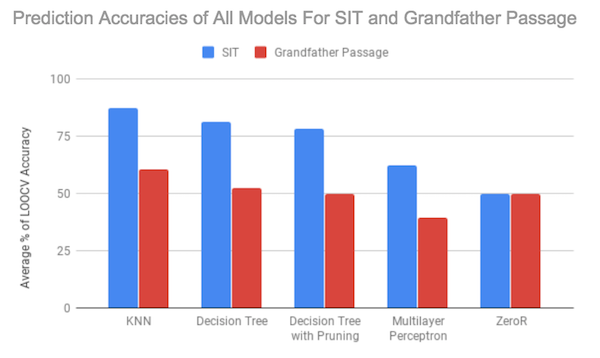Session Information
Date: Wednesday, September 25, 2019
Session Title: Cognition and Cognitive Disorders
Session Time: 1:15pm-2:45pm
Location: Agora 3 East, Level 3
Objective: The proposed work seeks to expand current machine learning algorithms in PD using both motor and language features to discriminate affected speakers from healthy controls.
Background: The use of automated analysis approaches in the clinical diagnosis of PD, and other neurodegenerative disorders, is appealing because it is fast, inexpensive, highly scalable, and requires little to no setup [1]. Machine learning approaches for discriminating PD speakers largely use motor features [2]. Extant research suggests that cognitive declines manifest as speech and language errors in spontaneous production tasks [3]. Consequently, algorithms based purely on motor features may have limited clinical utility for detecting cognitive impairment in PD.
Method: We used language production errors and pausing to classify standardized reading passages (Grandfather Passage) and phonetically balanced sentence sets produced by individuals with PD (n = 35 language samples) and healthy controls (n=35). Language samples were manually annotated (in CHAT/CLAN) for word retrieval, morphology, and sound production errors. We included select language production markers shown previously to reflect cognitive impairment in PD [4]. Manually coded language data were used to train classifiers based on K-Nearest Neighbor, ZeroR, decision tree, and multilayer perceptron approaches.
Results: The K-Nearest Neighbor approach applied to a phonetically balanced set of 11 standardized sentences produced the most robust solution correctly classifying 87.5% of the sentence samples and 60.53% of the standardized reading passage samples.
Conclusion: Acceptable classification of PD speakers was achieved using a language-feature based machine learning algorithm. While the work requires replication using larger samples, it is a promising first step for a machine learning algorithm sensitive to potential language markers of cognitive decline in PD. Such language-based algorithms can be important tools for remote monitoring of speech cognitive changes in PD.
References: 1. Tröger, J., Linz, N., Alexandersson, J., König, A., & Robert, P. (2017). Automated speech-based screening for alzheimer’s disease in a care service scenario. In Proceedings of the 11th EAI International Conference on Pervasive Computing Technologies for Healthcare – PervasiveHealth ’17 (pp. 292–297). Barcelona, Spain: ACM Press. https://doi.org/10.1145/3154862.3154915 2. Nilashi, M., Ibrahim, O., Ahmadi, H., Shahmoradi, L., & Farahmand, M. (2018). A hybrid intelligent system for the prediction of Parkinson’s Disease progression using machine learning techniques. Biocybernetics and Biomedical Engineering, 38(1), 1–15. https://doi.org/10.1016/j.bbe.2017.09.002 3. Burke, D. M. (2002). Language Production and Aging. In S. Kemper & R. Kliegl (Eds.), Constraints on Language: Aging, Grammar, and Memory (pp. 3–27). Boston: Kluwer Academic Publishers. https://doi.org/10.1007/0-306-46902-2_1 4. Roberts, A. and Orange, J.B. Discourse in Lowy body spectrum disorder. (2013). In Pragmatics in Dementia Discourse, pp. 153-211, Eds. Boyd Davis and Jacqueline Guendouzi. Cambridge Scholars Publishing: Newcastle upon Tyne.
To cite this abstract in AMA style:
B. Fujii, R. Richter, A. Roberts. The Promise of Automation: Development and preliminary testing of a language-based machine learning algorithm in PD [abstract]. Mov Disord. 2019; 34 (suppl 2). https://www.mdsabstracts.org/abstract/the-promise-of-automation-development-and-preliminary-testing-of-a-language-based-machine-learning-algorithm-in-pd/. Accessed April 22, 2025.« Back to 2019 International Congress
MDS Abstracts - https://www.mdsabstracts.org/abstract/the-promise-of-automation-development-and-preliminary-testing-of-a-language-based-machine-learning-algorithm-in-pd/

